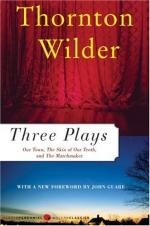|
This section contains 760 words (approx. 2 pages at 400 words per page) |
Thornton Wilder is considered one of America's most important authors, although The Matchmaker is not generally thought of as one of his most important works. Taken as an evening's entertainment, the play has always been well respected by critics. Negative views have only come when critics have thought the work of such an important author should do more.
Wilder's place in American literature is secure, if only because he is the only writer to have won Pulitzer Prizes for both fiction (for The Bridge of San Luis Rey) and drama (for both Our Town and The Skin of Our Teeth). Overall, his reputation as a dramatist has held up better than that as a novelist.
The Bridge of San Luis Rey is still required reading in literature classes, but it is seldom read outside of schools, and his other novels have disappeared. Our Town, on the other hand, remains one of the most enduring and most frequently performed works in America, performed by over four hundred amateur groups each year.
Wilder's first critical and popular success came with The Bridge of San Luis Rey in 1927. Not only did it win the Pulitzer, but it sold millions of copies. Just three years later, though, a critical backlash began with a 1930 article by Michael Gold for the New Republic and a second article he wrote later that year for New Masses, in which he said, "Yes, Wilder writes perfect English. But he has nothing to say in that perfect English. He is a beautiful, rouged, well-dressed corpse, lying among the sacred candles and lilies of the past, sure to stink if exposed to the sunlight." His criticism struck a chord with other reviewers, who began taking Wilder to task for his failure to address complex social problems. As Jackson Bryer explained the critics' complaints in his essay commemorating Wilder's one-hundredth birthday, "What these critics were saying was that Wilder was not sufficiently attuned to the problems of his day, that by setting his novels in remote times and places, he was ignoring the present." Bryer went on to explain that it had to be that way. Unlike other major writers of the day, such as Faulkner or Hemingway, Wilder grew up in different places on different continents, and so he had no place that he could feel deep in his heart was his own. It was natural for him to set his fictions in different times and places, even though some critics took this as a sign of aloofness.
It was not long after the critical backlash against his fiction began to arise that Wilder experienced his first success in the theater with The Long Christmas Dinner in 1931. Divided into three acts, it is, like most of his works (except, notably, The Matchmaker), experimental in form. This fragmented structure carried on in his works throughout the 1930s, reaching its high point in Our Town in 1938. Even more than Bridge of San Luis Rey, Our Town was hailed by critics and by audiences. A fairly representative example is John Mason Brown, who wrote that Our Town "is a remarkable play; one if the sagest, warmest, and most deeply human scripts to have come out of our theatre." The first version of The Matchmaker, named The Merchant of Yonkers, was produced the year following Our Town. Reviews are difficult to find because it had an extremely short run, fewer than thirty performances. Most critics attribute its failure to the direction of Max Reinhardt. Though Wilder wrote it for him, Reinhardt was German and probably did not understand the pacing of comedy suitable for American audiences. The evidence of this is that The Matchmaker was a success ten years later, even though the script is not substantially different.
Because Wilder had, by the time The Matchmaker was produced, won two Pulitzers and established himself as a fixture of the American literary scene, reviewers had to lower their expectations in order to think of the play in the right sense. As Rex Burbank was to put it in his overview of Wilder's career in 1961, "There is less claim to serious attention and contemplation in this play than in any of Wilder's other full-length works; and it should be enjoyed for what it is—a farce." The lack of social insight that became a rallying cry against Wilder in the 1930s helps readers understand the spirit of The Matchmaker, according to Burbank: "one enjoys laughing at Vandergelder's absurdities but is not constrained to give much thought to their social or ethical significance."
|
This section contains 760 words (approx. 2 pages at 400 words per page) |




